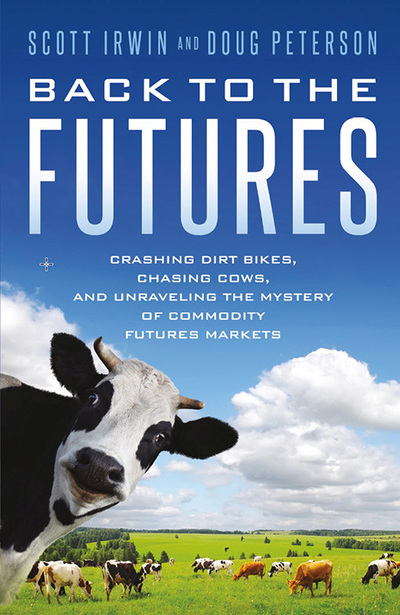
Scott Irwin, the Laurence J. Norton Chair of Agricultural Marketing in the department of agricultural and consumer economics at the University of Illinois Urbana-Champaign, is the author of "Back to the Futures," a book that's part personal memoir and part explainer of the futures market.
Photo by College of ACES
CHAMPAIGN, Ill. -A new book by a University of Illinois Urbana-Champaign expert in agricultural commodity markets explores a lifetime spent studying the massive markets that underpin the global financial system.
Scott Irwin, the Laurence J. Norton Chair of Agricultural Marketing in the department of agricultural and consumer economics at the University of Illinois Urbana-Champaign, is the co-author of "Back to the Futures," a book that's part personal memoir and part explainer of the futures market - the much-maligned invisible hand that controls the price of goods such as corn, soybeans, cattle and crude oil that lie at the heart of the U.S. economy.
"I've thought about commodity markets for decades as an academic, and I've lived it as the son of a farmer, so I wanted to take on a big challenge and see if I could explain how the futures markets work in a way that the general public could readily understand, but also add a personal touch," he said. "I've spent basically my entire adult life trying to understand and explain the workings of these markets, so this is my attempt to demystify it for the broader public."

"Back to the Futures," published by Ceres Books
Irwin's journey started as a young boy in a small farming community near Bagley, Iowa, when he nearly died after getting hit by a truck speeding along the town's two-lane highway. The irony, according to Irwin, was that the near-fatal accident took place by the local grain elevator - the very spot where his love of agricultural markets first took root.
"You could trace a line from that grain elevator all the way to the floors of the Chicago Board of Trade and the Chicago Mercantile Exchange, as well as to where am I today," Irwin said. "Both of those places were magical to me, and the connection between the two runs deep."
Irwin said he took a page from acclaimed author Michael Lewis ("Liar's Poker," "Moneyball," "The Big Short") in trying to make the somewhat-inscrutable machinations of the market accessible via first-person narration.
"I'm using these personal experiences as a way to introduce the more technical aspects of what I'm writing about - parables about personal risk, and then broadening the scope and explaining it in a professional context," he said. "So a personal narrative frame that flows into these somewhat wonky market explainers and then back again."
Thematically, the book is about the uncertainty of it all: The element that risk plays in life - real life, and in the markets, Irwin said. To that end, there are even more close encounters with death throughout the book: stunts with motorcycles, snowmobiles, race cars, farm equipment and run-ins with renegade cows while growing up on the family farm.
"The idea behind the book was, I thought that I had enough crazy personal stories about risk and risk management that these could serve as scaffolding for a larger story," he said. "To the average person, markets are kind of abstract, so there's an innate challenge in attempting to explain and render these complex interactions at a human scale to a non-academic audience. Basically, this book tries to take the mystery out of the markets and show that there are actual humans behind it."
The book also is a full-throated defense of the much-maligned role of speculation in the futures markets.
"Speculators have certainly gotten a bad rap, but I would argue that by taking risks, they reduce the risk on the little guy - the farmers and the middle operators, such as those who run the storage elevators or process grain," Irwin said. "Basically, the people I grew up with."
Although it's not a textbook and the style and stories are somewhat irreverent, the subject matter itself is serious, Irwin said.
"Narratively speaking, that's a difficult tension to manage, converting your personal stories to a fun and entertaining book about the futures markets," he said. "After you read this book, especially the more technical parts, you'll have a better understanding of what they talk about on CNBC. Or if you're reading the Wall Street Journal, you'll have a better feel for what's going on, especially in the agricultural commodity markets."
The book will be published April 19 by Ceres Books.
Irwin's co-author was Doug Peterson.






